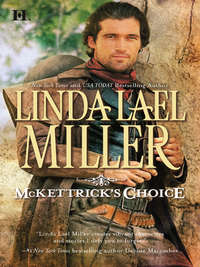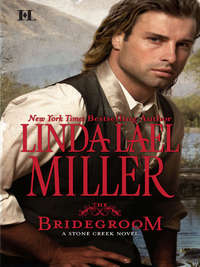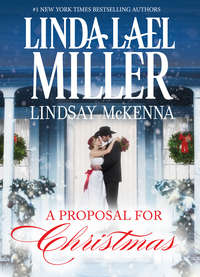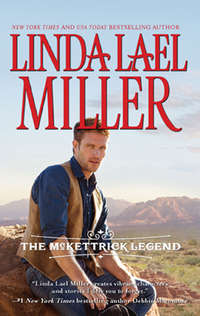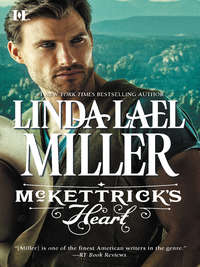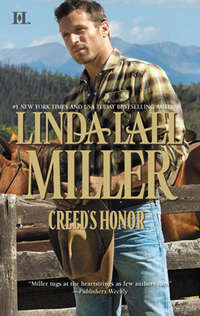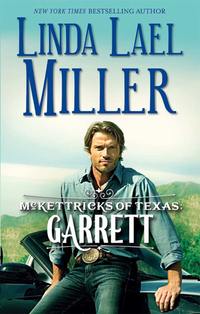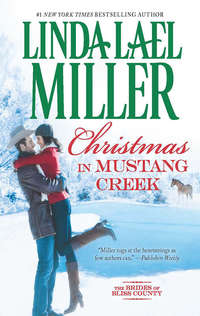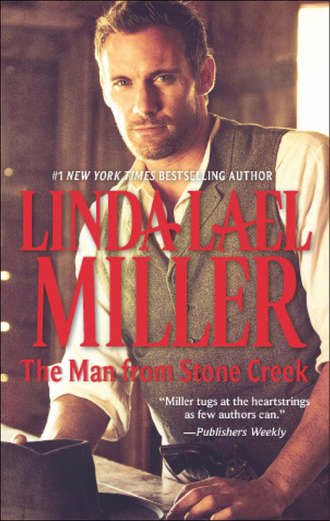
Полная версия
The Man from Stone Creek
Maddie stared after them, confounded.
Sam O’Ballivan helped himself to a towel, four cotton shirts and a shiny new bucket.
“This tub costs eight dollars,” Maddie pointed out when she’d had a few moments to recover. “I don’t—”
Mr. O’Ballivan paused, took a wallet from the inside pocket of his coat and inspected the contents thoughtfully. Even from where she stood, Maddie could see that he had plenty of money, and that made her wonder even more.
“I think I can cover it,” he concluded, replacing the wallet.
“Who are you?” Maddie demanded. It was her nature, after all, to be forthright, and she’d held her curiosity in check as long as she could.
He added three pairs of socks to the pile. “You don’t have much of a memory,” he said. “I believe I’ve already introduced myself.”
Maddie rounded the counter and advanced, setting her hands on her hips and forcing him to stop and face her. “I guess you didn’t notice that Mungo Donagher doesn’t want you coming to his house for supper.”
Sam’s mouth quirked again, though he didn’t actually smile. “Now that hurts my feelings,” he said. “The invitation sounded sincere enough to me.”
Maddie gave an exasperated sigh. “Oh, it was sincere, all right. Undine meant every word of it. It’s Mungo I’m worried about.”
“Now why would you worry about Mungo or anything else, Miss Chancelor?”
Maddie knotted her hands in her apron, so she wouldn’t box Sam O’Ballivan’s ears. “You’re new in Haven, and you obviously have the sensibilities of a hitching post, so I’ll tell you,” she said. “Mr. Donagher is a hard man. He’s vengeful and he’s rich, and when folks get on his bad side, they tend to meet with sudden misfortune.”
“I do appreciate your concern, Miss Chancelor, but I’m not afraid of that old coot. Do you have any storybooks?”
Maddie blinked. “Storybooks?”
Sam’s eyes danced. “For kids,” he explained with the sort of patience one usually reserves for an idiot.
Maddie gestured toward a table in the far corner of the store, followed determinedly when Sam headed in that direction. She was about to pursue the subject of his identity again when she noticed the reverent way he chose and examined a volume of fairy tales. It made her throat tighten.
“My mother used to read those stories to me,” she said, and then could have bitten off her tongue at the hinge. Mr. O’Ballivan’s gaze came straight to her face, and she felt exposed, as if her memories were no more private than the goods displayed in the window at the front of the store.
“Did she?” he asked quietly.
Maddie swallowed, nodded. Looked away.
Sam caught her chin between his thumb and the curve of his forefinger. His flesh was calloused, giving the lie, yet again, to his being a schoolmaster. He turned her head so she had to meet his eyes.
His touch made her nerves spark under her skin. She wanted to pull away, but she couldn’t quite make herself do it. In fact, she couldn’t even speak, so she just stood there, like a fool, astounded by her own weakness.
“How is it that you’re not married, Maddie Chancelor?” Sam asked gravely, and let his hand fall back to his side.
Maddie moistened her lips. It was a forward question, one he had no right to ask. She was surprised when she heard herself answer. “I was engaged once,” she said softly. “He was killed.”
She waited for the pain that always came when she merely thought of Warren, let alone mentioned him out loud, but it didn’t come.
“I’m sorry,” Sam O’Ballivan said solemnly.
“It’s been five years,” Maddie answered, and was grateful when the bell jingled over the door. She’d been alone with Mr. O’Ballivan, or whoever he was, for much too long.
* * *
ONCE HE’D SETTLED UP his bill and Maddie had promised to send Terran around in a buckboard with the things he’d bought, Sam left the store. The basket Bird had brought him the night before was on the bench on the sidewalk, where he’d left it.
He’d return it to Oralee Pringle, with his thanks, and ask her about Bird while he was at it. A good part of his mind stayed behind, though, worrying at Maddie Chancelor like an old dog with a soup bone.
She’d loved a man, five years ago, enough to say she’d marry him.
Why did it open a hollow place inside him, knowing that? Maddie was a beautiful woman, and she must have had suitors right along. Had she laid her heart in the casket, with her intended, and closed the lid on it for good? And why should it matter to him, anyway, when he was all but promised to the major’s daughter?
He crossed the street, weaving his way between horses and wagons, and strode along the wooden sidewalk toward the Rattlesnake. The tinny strains of an out-of-tune piano spilled over the swinging doors and he paused outside, trying to shake off his melancholy mood.
An old, swaybacked horse stood at the water trough, square in front of the saloon, a little apart from the others, reins hanging loose. He was spotted, and his ribs showed.
Sam paused to pat him. “You look about as sorrowful as I feel,” he said.
“You brought the basket back.”
Sam turned his head, saw that Bird had stepped out of the saloon to stand on the sidewalk. In the light of day, she looked even younger than she had the night before. She wore a red dress that showed her legs and too much bosom, and her face was freshly painted.
“I’m obliged,” he said, still stroking the horse. “That was the best supper I’ve had in a long time.”
Bird smiled and took the basket. “I guess you meant to thank Oralee,” she said. “She’s gone to Tucson. Won’t be back until tomorrow sometime.”
Sam nodded.
Bird lingered. “That’s Dobbin,” she said, indicating the horse. “He’s a pitiful old fella, isn’t he? Belongs to Charlie Wilcox. Stands out here, patient as the saints, all day every day, waiting for Charlie to finish swilling whiskey and ride him on home. Charlie’d never get back to that shack of his if it wasn’t for Dobbin.”
Sam felt a pang of sympathy for the horse. Wished he could put him out to pasture, with Dionysus, come summer, and let him eat his fill of good grass.
He stepped away from Dobbin, stood looking down at Bird.
“You gonna ask me how old I am again?” she asked, smiling up into his face.
“I’d like to,” he said, “but I reckon I’d be wasting my breath.”
“I’m seventeen,” she told him.
More like fifteen, he thought, sorrier for her than he was for the horse. “How did you end up working in a place like the Rattlesnake Saloon?” he asked.
She shrugged. “Just makin’ my way in the world,” she replied without a trace of self-pity. “We’ve all got to do that, don’t we?”
“I guess we do,” Sam agreed. “Don’t you have any folks?”
“Just a sister,” Bird said. “She’s married, and I was a trial to her, so she showed me the road. You comin’ inside?”
Sam shook his head, pondering. He’d never had a sister, but if he had, he wouldn’t have turned her out, whether she was a trial to him or not.
Bird looked crestfallen. “How come you don’t like me?” she blurted. “Most men take to me right away.”
“I like you fine,” Sam said. “That’s the problem.”
She went from crestfallen to confused. “I don’t understand.”
“I don’t imagine you do.” On impulse, he reached out, took her hand, squeezed it lightly. “If you ever need help, Bird, you come to me.”
She smiled sadly. “It’s too late for that,” she said. Then, carrying the basket, she turned and hurried back into the saloon.
Sam stared after her for a few bleak moments, patted Dobbin again, then headed back toward the schoolhouse.
One of these days he was going to stop wanting to save worn-out horses and misguided girls and a whole lot of other things. It would be pure, blessed relief when that day came.
CHAPTER THREE
SAM WAS OUT BACK of the schoolhouse, splitting wood for the fire, when Terran rolled up at the reins of an ancient buckboard, drawn by two sorry-looking horses, one mud-brown, the other a pink-eyed pinto. Their hooves wanted trimming, he reflected, lodging the ax in the chopping block and dusting his hands together. If he’d had his hasp handy, he’d have undertaken the job right then and there.
Terran, perched on the seat, drew up the team, set the brake lever with a deft motion of one foot, and jumped to the ground. Sam’s copper tub gleamed in the bed of the wagon, catching the last fierce rays of the setting sun.
The boy rounded the buckboard, lowered the tailgate with a creak of hinges, and scrambled in to haul the boxes to the rear, where Sam was waiting to claim them.
“Too bad you ain’t a lady,” Terran remarked, admiring the tub. “You could give Violet Perkins a sudsing.”
Sam hoisted the box containing his coffee, sugar, canned goods and toiletries. “There are worse things,” he observed, “than smelling bad.”
“That depends,” Terran replied, sliding back another box, “on whether or not you’re downwind from her.”
Holding back a smile, Sam set the first crate on the ground and reached for the second. “Is it true that Violet’s father was hanged for a horse thief?”
Terran paused to meet his gaze. “Somebody lynched him, that’s for sure,” he answered solemnly. “Maddie thinks it was the Donagher brothers.”
“I take it there’s no law in this town,” Sam ventured. He’d seen a jailhouse, walking back from the store the day before, but the windows had been shuttered and except for an old yellow dog sunning himself on the wooden sidewalk in front of the door, there had been no sign of habitation.
Terran shrugged, then squared his shoulders to move the copper tub. “Not since Warren Debney was gunned down five years ago,” he said. “He was the town marshal.”
The statement snagged Sam’s attention. It’s been five years, Maddie had said back at the mercantile when he’d offered his condolences on the death of the man she’d planned to marry. He wanted to ask Terran, straight-out, if his guess was right, but he couldn’t think of a way to do it without prying into what amounted to family business.
“How did it happen?” Sam inquired, grasping the tub and lowering it to the ground.
Terran stood, tight-fisted, in the empty wagon bed, staring down at Sam. His expression was flat, giving away nothing of his thoughts. “Warren was walking Maddie home from a social at the church that night,” he recalled, his voice so quiet that Sam had to strain to hear it. “Somebody shot him from the roof of the telegraph office. Maddie had blood all over her dress when they brought her home.”
Sam closed his eyes against the image, though violence of that kind was nothing new to him, and if the boy had been standing on the ground he’d have laid a reassuring hand on his shoulder. “Did they ever run the shootist to ground?” he asked.
Terran shook his head, kept his eyes averted. Sam caught the glint of tears despite that effort. “He’d tangled with Rex Donagher the day before, Warren had, and some folks thought Rex was the one did it, but things never went any further than that.”
“The town never replaced Debney? Got themselves a new lawman?”
Terran gave a bitter snort at that. “If there’s a prisoner—and that ain’t often—old Charlie Wilcox usually stands guard. If he’s sober enough, anyhow.”
Charlie Wilcox, Sam recalled, from his conversation with Bird out in front of the Rattlesnake Saloon that afternoon, was evidently the town drunk. Nothing much to recommend him, it seemed, save that he was the owner of a loyal horse.
Sam pulled a penny from his vest pocket—he’d left his suit coat inside the schoolhouse when he saw the need to chop wood—and extended the coin to Terran. “Thanks,” he said.
Terran blinked. “What’s that for?”
“Delivering my goods,” Sam replied.
Terran’s gaze strayed to the Colt .45 on Sam’s hip, and his eyes widened. He advanced a step to take the penny. “Obliged,” he said, but he was looking at the revolver, not the penny.
“You any good with that gun?” he ventured to ask.
Sam let one corner of his mouth tilt upward. “Just use it for shooting snakes, mostly,” he lied.
Terran closed his hand tightly around the penny. Met Sam’s eyes. “I never knew a schoolmaster to pack a .45 before,” he said. “Mr. Singleton sure didn’t.”
“Mr. Singleton,” Sam answered, “is a whole different kind of man than I am.”
“We didn’t mean to hurt him,” Terran said.
Sam nodded. “I believe that,” he allowed. “But a prank can go wrong, mighty fast, even when nobody intends for it to happen. And there are ways to do a man injury that don’t leave any marks on his hide.”
Terran’s cheeks blazed, making his freckles stand out in bold relief. He hitched up his pants and then stood with his feet spread and his hands on his hips. “You mean to mete out punishment, Mr. O’Ballivan?”
Sam shook his head. “Not unless it’s called for, Mr. Chancelor,” he replied. He gave a sparing smile. “And I don’t reckon any of you will take a notion to try putting me down the well.”
Terran tried to look solemn, but it was a lost cause. He grinned. “No, sir,” he said, “I don’t reckon we will.”
Sam put out his hand, waited.
The boy hesitated, then took it, and they shook on the bargain.
Terran was the first to speak. “Maddie says you aren’t like any schoolteacher she’s ever seen,” he confided.
Sam chuckled and shut the tailgate. “Is that right?”
Terran hesitated a moment, as if he might say something more, but then he scrambled over the back of the wagon seat to take up the reins again. Looking back at Sam over one scrawny shoulder, he gave another grin. “She don’t appreciate having to take her supper at the Donaghers’s tomorrow night, neither.”
“Why’d she agree to go, then?” Sam asked, honestly puzzled, as the boy cranked the brake lever forward.
“Said she was roped into it,” Terran answered. Then, blithely, he added, “Maddie reckons as how if you’re stupid enough to step right into a scorpions’ nest, she’d better go along and see that you don’t get stung.”
“Kind of her to look out for me,” Sam said dryly.
Terran swung the wagon around in a wide circle in the grass, and when he pulled up alongside Sam, his expression had turned somber. “She looked out for Warren, too,” he said, “and they still killed him.”
Sam didn’t know what to say to that, so he didn’t say anything at all.
“See you tomorrow,” Terran told him.
Sam saluted and watched with his thumbs hooked in his gun belt as the boy drove back toward the road. Once Maddie Chancelor’s little brother was out of sight, he went back, took up his ax again and chopped the rest of the wood with more force than the job truly required.
* * *
MUNGO DONAGHER SURVEYED his bride as she dashed from one end of the ranch house kitchen to the other, grabbing down china plates from the cupboard and inspecting them for God-knew-what. She didn’t bother with cooking—they had Anna Deerhorn to do that, along with the cleaning and other household work—but ever since she’d invited the schoolmaster out for a meal, she’d been in a fine dither of preparation.
“If I didn’t know better,” Mungo said sourly, “I’d think you were taken with that O’Ballivan feller.”
Undine stopped her china-studying and turned to look at him, her eyes wide with innocent affront. “What a dreadful thing to say, Mungo Donagher,” she protested, putting one hand to her glossy black hair and pressing the other to her throat. “There’s only one man for me, and that’s you.”
Mungo knew he was being a damned fool, but he went ahead and believed her anyhow. It would have been hard not to, the way she was looking at him with those big purple eyes of hers. Lord, but she was a pretty thing, and lively in private, too.
He put out his arms, and she came to him with just the briefest hesitation and the smallest sigh. He ignored that, and held her close against him, filling his nostrils with the lemony scent of her hair.
Just then the side door swung open and his youngest, Ben, burst through from outside, clutching a speckled pup in both arms.
“Get that dog out of this house,” Mungo commanded, loosening his hold on Undine and pretending he didn’t notice how quickly she drew back.
The boy swallowed. His eyes were red-rimmed, and the way he was breathing, fast and shallow, usually signaled one of his fits. “Garrett and Landry,” he gasped, “they said they was gonna drown him in the crick!”
“It’d be a favor to me if they did,” Mungo growled. “Save me feeding him.”
Ben held the mutt closer. “Please, Pa,” he pleaded, gasping a little as he parceled out his words. “He’s a good dog, and he’s got a name, too. It’s Neptune.”
“Neptune,” Mungo muttered. “That’s a damn sissy name if I ever heard one.”
Undine shifted, so she was standing just back of Ben. “Let him have the pup, Mungo,” she said quietly. “It’s not so much to ask.”
Undine had a soft spot when it came to critters. Wanted one of those silly little dogs, small enough to ride in a reticule. She’d seen women carrying them around in the big city and been struck by the fancy ever since. Though just what “big city” that was, she’d never shared.
“Critters don’t belong in the house, Undine,” he said patiently.
She rested a light hand on Ben’s shoulder. “The child’s in a state,” she pointed out, as if Mungo didn’t have eyes in his head to see that for himself.
The boy shuddered. He was fragile, as his mother had been, God rest her soul. Elsie had died having him, and sometimes Mungo still felt a pang of grief when he recollected her. For the most part, though, he was glad to be shut of Elsie, same as he was his first wife. Hildy’d given him three strong sons, but she’d been good for nothing much besides. Tended to weeping spells and fits of sorrow. Always pining for the home folks back in Pennsylvania, that was Hildy. One day, with winter coming on, like it was now, he’d herded Garrett, Landry and Rex to town for boots. Hildy had taken his best hunting rifle, gone around behind the chicken coop, stuck the barrel in her mouth and pulled the trigger.
Blew the whole back of her head off, and he’d found her like that.
The memory made him set his jaw. “I don’t like to encourage weakness in my boys, Undine,” he said firmly. “That dog’s small now, but he’ll be big as a yearling calf before you know it.”
Undine tilted her head to one side and gave him that look, the one she got when she meant to have her way. “Ben can keep him in his room for now. You’ll never even know he’s here.”
By that time, Ben was staring up at Undine, openmouthed, his eyes round with amazement.
“Say it’s all right, Mungo,” Undine crooned.
Ben was breathing easier. He turned his gaze slowly back to his father’s face. “I’ll take Neptune to school with me, come Monday mornin’,” he said on a rush of air. “That way, he won’t be getting underfoot around here all day.”
“A dog’s got no business in a schoolhouse,” Mungo groused, testy because he knew he’d been bested. He’d never have given in to the boy, but Undine had ways of making a man wish he’d done otherwise if he went against her grain.
“I can’t leave him here, Pa,” Ben told him. “They’ll hurt him if I do.”
Mungo cursed. “All right,” he said. “All right! But if I trip over that mutt one time—”
A smile lit Ben’s face. “You won’t, Pa. I promise you won’t.” With that he ran for the back stairs, still squeezing that infernal pup.
“He’ll grow up to be just like that Singleton fella, if this keeps on,” Mungo muttered. He shook his head just to think of one of his sons, with Donagher blood flowing in his veins, mewling over some stray bitch’s get found by the side of the road. It would have been a far better thing, to his mind, if Garrett and Landry had drowned that useless hank of hair and hide and been done with it.
Undine stepped in close, put the cool, smooth palms of her hands to either side of his face. “You’re too hard on him,” she said, breathing the words more than saying them. “He’s barely twelve years old, Mungo.”
“When I was twelve years old,” Mungo rumbled, “I was mining coal in Kentucky. Supporting my ma and two sisters.” It still plagued him sometimes, the memory of those hard and hopeless days—never saw the sunshine, it seemed, or drew in a breath of clean air. One day, he’d just had enough. Laid down his shovel for good and headed west, working as a roustabout for the Army as far as Ohio, then taking whatever job he could to patch together a living.
In time, he’d saved up a good bit of money, and then, when he was twenty-one, he’d struck it lucky in the California gold fields and bought himself the beginnings of the vast cattle ranch he owned today. Still troubled his conscience, now and then, the way he’d left Ma and the girls to look out for themselves, but he reckoned they’d managed. He’d sent them money, when he could, but never got so much as a letter back to say thanks.
It was like his mother to hold a grudge, and mostly likely she was dead by now anyway. He wondered sometimes how his sisters had fared, if they’d married and had children, but he’d long since resigned himself to not knowing.
Undine touched his top shirt button, brought him back from his somber wanderings. “Times are different now,” she said. “Folks live gentler than they used to.”
“You’re in a kindly frame of mind today,” Mungo remarked fondly, resting his forehead against Undine’s.
She smiled, pulling back to look into his eyes. “Maybe it would be a good thing,” she said, very quietly, “to send Ben away to school. There are some fine places in San Francisco. We could take him there, get him settled, and have ourselves a little honeymoon trip in the bargain.”
Mungo frowned. “That would cost a pretty penny,” he said.
“The boy would be making his own way in no time,” Undine reasoned. Again she smiled, and even though Mungo knew he was being handled like a hog balking at a gate, he didn’t mind. “And you’d never miss the money. You’re the richest man in this part of the Arizona Territory, if not the whole of it. And I would so enjoy being fitted for some fine dresses, instead of ordering ready-mades out of Maddie Chancelor’s silly catalogs.” She sighed and her eyes glistened, wistful and faraway. “Sometimes I get such a loneliness for the city, stuck out here the way we are, it’s like an ache inside me. Makes me just about frantic to get away.”
Her words struck a chill in the depths of Mungo’s crusty soul. Undine was like a brightly plumed bird, a spot of color in a grim landscape. Without her, the days would be a hollow round of hard work, and the nights—well, they’d be unbearable.
“You’re not thinkin’ about leavin’ me, are you?” he asked, his voice so hoarse it felt like rusty barbed wire coming out of his throat. He’d met Undine on a cattle buying trip up toward Phoenix, a year before, wooed her with what geegaws he could find in the shops, and brought her home as his wife. She’d been reluctant, until he’d shown her the size of the herd he and the boys would be driving back down to Haven.
“A lady thinks about all sorts of things,” she admitted. “Please, Mungo. If I have to pass the winter in this place, I might go mad.”
Talk of madness made Mungo profoundly uneasy, deep in his spirit. Undine didn’t know about Hildy and the way she’d given up on living; he’d told her very little about his two previous marriages, other than to say that Garrett, Landry and Rex were by his first wife and Ben by his second.
“The boys can handle the ranch for a few months,” Undine wheedled, looking up at him with imploring, luminous eyes.
Mungo huffed out an exasperated breath. “Leave them in charge,” he said, “and we’d be lucky if we came back to an inch of land and a bale of moldy hay next spring.”
“You’ve got that banker, Mr. James, to ride herd on them,” she replied. He knew by her tone that she was stepping lightly, picking her way from one idea to the next, though she’d long since mapped out the route in her mind. She bit her plump lower lip. “I might just have to go by myself if you won’t come with me.”


